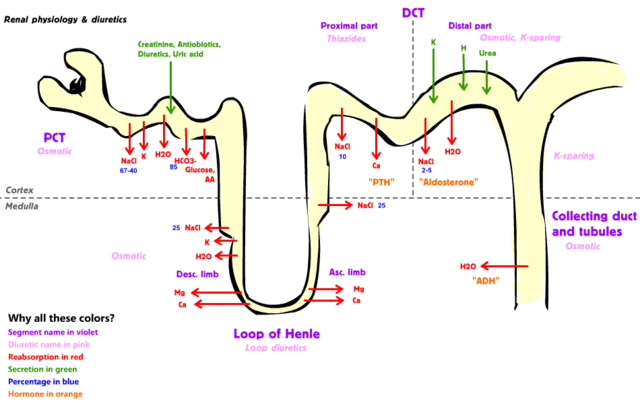Diuretics increase urine production to remove excess fluid and salt, while antidiuretics reduce urine production to control fluid balance.
Welcome to our article where we will explore the key differences between diuretics and antidiuretics. These medications play a crucial role in maintaining fluid balance in the body. Understanding their mechanisms, functions, and differences is essential for optimal healthcare management. So, let’s delve into the fascinating world of diuretics and antidiuretics!
Key Takeaways:
- Diuretics help remove excess fluid and salt by increasing urine production.
- Antidiuretics reduce urine production and control the movement of fluid out of the body.
- Diuretics work by adding extra salt and water to urine, while antidiuretics suppress the diuresis process.
- Both diuretics and antidiuretics play crucial roles in maintaining fluid balance in the body.
- It is important to understand the differences and functions of these medications for effective healthcare management.
Understanding Diuretics

Diuretics, also known as water pills, are medications that help remove excess fluid and salt from the body through increased urination. They play a crucial role in managing conditions such as high blood pressure, fluid accumulation, and heart failure.
Diuretics work by making the kidneys eliminate extra salt and water by adding them to urine. By increasing urination, diuretics aid in the removal of fluid and salt from the body, helping to maintain a healthy fluid balance.
These medications are available in different forms, including pills and injections. They are typically taken once or twice a day, as prescribed by a healthcare professional.
While diuretics can effectively reduce fluid accumulation and manage high blood pressure, they may also have some side effects. Increased urination is a common side effect of diuretics, which can lead to frequent trips to the bathroom. Some individuals may also experience dizziness, tiredness, and low potassium levels as a result of taking diuretics.
| Benefits of Diuretics | Side Effects of Diuretics |
|---|---|
|
|
It is important to take diuretics as prescribed and follow the recommended dosage to minimize the risk of side effects. It is also advisable to consult a healthcare professional for personalized advice and to discuss any potential interactions or precautions.
Exploring Antidiuretics

Antidiuretics are medications that help control fluid balance in the body by reducing urine production. The major endogenous antidiuretic substances are antidiuretic hormone (ADH or vasopressin) and oxytocin. These hormones can also be administered externally as medications to regulate fluid balance. Antidiuretics are commonly used for conditions such as diabetes insipidus and to reduce urinary volume.
Common Antidiuretics
Antidiuretics can be classified into various types, including:
| Type | Examples |
|---|---|
| ADH Analogs | Argipressin, Desmopressin |
| Oxytocin Analogs | Oxytocin |
| Vasopressin Analog | Vasopressin (Pitressin) |
Uses and Conditions
Antidiuretics are used to treat various conditions and disorders, including:
- Diabetes insipidus: A condition characterized by excessive thirst and urination due to a deficiency of antidiuretic hormone.
- Urinary volume reduction: Antidiuretics can help reduce urinary volume, preventing excessive fluid loss.
It’s important to note that antidiuretics should only be used under medical supervision and in accordance with a healthcare professional’s recommendations.
Side Effects
While antidiuretics are generally considered safe and effective, they may have side effects. Common side effects can include:
- Diarrhea
- Nausea
- Weakness
- Allergic reactions
It is crucial to consult a healthcare professional if any unusual or severe side effects occur.
The table below summarizes the uses, common antidiuretics, and potential side effects of these medications:
| Condition | Common Antidiuretics | Potential Side Effects |
|---|---|---|
| Diabetes insipidus | Argipressin, Desmopressin | Diarrhea, Nausea, Weakness |
| Urinary volume reduction | Argipressin, Desmopressin, Vasopressin | Allergic reactions |
Similarities Between Diuretics and Antidiuretics
Diuretics and antidiuretics, despite their differences, share several important similarities in how they help maintain the body’s fluid balance. Diuretics work by increasing urine production, which helps remove excess fluid and salt from the body. On the other hand, antidiuretics reduce urine production and control the movement of fluid out of the body. Both types of medications can be obtained in different forms, such as pills, making them accessible for individuals to manage their fluid balance either on their own or under medical guidance. It’s crucial to note that both diuretics and antidiuretics may have potential side effects, although they can vary between the two. Monitoring for any adverse reactions is important for ensuring their safe usage.
Diuretics and antidiuretics have similar functions in regulating fluid balance, are available in various forms, and may have potential side effects. Understanding these similarities can help individuals make informed decisions about managing their fluid balance effectively and safely, whether through self-administration or under medical supervision.
Diuretics vs Antidiuretics: A Comparison
The key difference between diuretics and antidiuretics lies in their function.
Diuretics are medications that promote the removal of excess fluid and salt from the body through increased urine production. They work by adding extra salt and water to urine, which helps in fluid removal. Common diuretics include hydrochlorothiazide, furosemide, and spironolactone.
On the other hand, antidiuretics are medications that reduce urine production and control the movement of fluid out of the body. They help in urine reduction by suppressing the diuresis process. Antidiuretics are commonly prescribed for conditions such as diabetes insipidus and to reduce urinary volume. Examples of antidiuretics include argipressin, desmopressin, and vasopressin.
Here’s a summarized comparison of the differences between diuretics and antidiuretics:
| Diuretics | Antidiuretics |
|---|---|
| Promote fluid removal | Reduce urine production |
| Work by adding extra salt and water to urine | Suppress the diuresis process |
| Used for conditions such as high blood pressure, heart failure, and fluid accumulation | Used for conditions such as diabetes insipidus and to reduce urinary volume |
Understanding the differences in mechanism and function between these medications is crucial for healthcare management and ensuring optimal fluid balance in the body.
Understanding the Mechanisms of Diuretics and Antidiuretics
Diuretics and antidiuretics are vital for controlling fluid balance in the body, but they work differently. Diuretics increase urine production to remove extra fluid and salt, while antidiuretics decrease urine production to keep fluid in the body.
Diuretics boost kidney function, helping them filter and remove excess fluid and electrolytes. They’re helpful for conditions like edema, high blood pressure, and heart failure. Antidiuretics, like vasopressin or ADH, work by stopping water loss in the kidneys, preserving fluid volume. They’re crucial for conditions such as diabetes insipidus. Some antidiuretics, like desmopressin, are given as medication to help control fluid balance.
Overall, diuretics and antidiuretics operate through distinct mechanisms to achieve fluid balance control. While diuretics increase urine production to remove excess fluid and salt, antidiuretics reduce urine production to retain fluid and maintain osmotic balance. These medication approaches target different aspects of renal function and hormone action, providing effective solutions for various conditions related to fluid balance control.
The Impact of Diuretics and Antidiuretics on Fluid Balance
Diuretics and antidiuretics play crucial roles in maintaining fluid balance in the body. Diuretics, also known as water pills, help remove excess fluid, leading to increased urine production. This process helps regulate fluid volume and electrolyte balance.
On the other hand, antidiuretics reduce urine production to conserve fluid and maintain osmotic balance. These medications work in conjunction with the urinary system and the processes of water reabsorption to control fluid balance.
Diuretics act on the kidneys to increase urine production, leading to the removal of excess fluid and electrolytes. They inhibit the reabsorption of sodium and water, promoting their excretion in the urine.
Antidiuretics, such as antidiuretic hormone (ADH) or vasopressin, act on the kidneys to decrease urine production and promote water reabsorption. ADH regulates water balance by stimulating water reabsorption in the collecting ducts of the kidneys.
Here is a table summarizing the impact of diuretics and antidiuretics on fluid balance:
| Medication | Effect on Fluid Balance |
|---|---|
| Diuretics | Promote increased urine production to remove excess fluid and electrolytes |
| Antidiuretics | Reduce urine production to conserve fluid and maintain osmotic balance |
By understanding the mechanisms of diuretics and antidiuretics, healthcare professionals can effectively manage fluid balance issues in patients. It is important to consider the specific needs of individuals and monitor their fluid and electrolyte levels when prescribing or administering these medications.
The Importance of Diuretics and Antidiuretics in Medical Conditions
Diuretics and antidiuretics are essential for managing many health problems and keeping us healthy. They’re often prescribed for conditions like high blood pressure, heart failure, diabetes insipidus, and fluid buildup in the body.
When someone has high blood pressure, diuretics help by reducing the extra fluid in their body, which lowers blood pressure. Diuretics work by making the kidneys produce more urine, getting rid of excess fluid and salt. For heart failure, where the heart can’t pump blood well, diuretics help by getting rid of extra fluid, making it easier for the heart to work. And in rare cases of diabetes insipidus, where someone makes too much urine, antidiuretics help by reducing urine production, preventing dehydration and keeping fluid levels right. Overall, diuretics and antidiuretics help manage health issues by balancing fluids and keeping us well.
Medical Conditions Treated with Diuretics and Antidiuretics
| Medical Condition | Treatment |
|---|---|
| High Blood Pressure | Diuretics (such as thiazide diuretics and loop diuretics) |
| Heart Failure | Diuretics (such as loop diuretics) |
| Diabetes Insipidus | Antidiuretics (such as desmopressin) |
| Fluid Accumulation | Diuretics and Antidiuretics (depending on the underlying cause) |
Potential Side Effects and Precautions
Like any medication, diuretics and antidiuretics come with potential side effects and precautions. It is crucial to be aware of these before starting or continuing the use of these medications. Understanding the possible side effects and taking proper precautions can help ensure medication safety and minimize any potential risks.
Side Effects of Diuretics
Diuretics, commonly known as water pills, work by increasing urine production to remove excess fluid and salt from the body. While diuretics can be effective in managing various conditions, they may also cause certain side effects. Some common side effects of diuretics include:
- Increased urination
- Dizziness
- Tiredness or fatigue
- Low potassium levels (hypokalemia)
It is important to monitor these side effects and consult a healthcare professional if they persist or worsen. They may require specific management or adjustments in medication dosage.
Side Effects of Antidiuretics
Antidiuretics, on the other hand, help reduce urine production and control fluid balance in the body. While they can be beneficial in certain medical conditions, antidiuretics may also have side effects. Some common side effects of antidiuretics include:
- Diarrhea
- Nausea or vomiting
- Weakness
- Allergic reactions (in rare cases)
If these side effects occur or persist, it is crucial to seek medical attention for appropriate evaluation and management.
Precautions
When using diuretics or antidiuretics, it is important to take certain precautions to ensure medication safety and optimize their effectiveness. Consider the following precautions:
- Follow proper dosage instructions provided by the healthcare professional.
- Do not exceed the prescribed dosage or change the dosage without consulting a healthcare professional.
- Inform the healthcare professional about any pre-existing medical conditions, allergies, or medications being taken.
- Monitor and report any unusual symptoms or side effects.
- Avoid abrupt discontinuation of the medication without medical guidance.
- Ensure regular follow-up appointments with the healthcare professional to assess the effectiveness and tolerability of the medication.
Taking these precautions can help ensure the safe and effective use of diuretics and antidiuretics, minimizing potential risks and maximizing their beneficial effects.
Consult a Healthcare Professional
It is essential to consult a healthcare professional for personalized advice and guidance regarding the use of diuretics and antidiuretics. They can provide appropriate recommendations based on individual health conditions, medication interactions, and potential risks. Consulting a healthcare professional ensures optimal medication safety and effectiveness in managing fluid balance and related conditions.
Conclusion
In conclusion, diuretics and antidiuretics play crucial roles in maintaining fluid balance in the body. Diuretics are medications that help remove excess fluid and salt by increasing urine production, while antidiuretics reduce urine production and control the movement of fluid out of the body. These medications have distinct functions that are important for optimal healthcare management.
Diuretics, such as water pills, are commonly prescribed for conditions like high blood pressure, fluid accumulation, and heart failure. They work by making the kidneys eliminate extra salt and water through increased urination. On the other hand, antidiuretics like antidiuretic hormone (ADH) and oxytocin help regulate fluid balance by reducing urine production. They are used for conditions such as diabetes insipidus and to reduce urinary volume.
FAQ
What are diuretics and antidiuretics?
Diuretics are medications that help remove excess fluid and salt from the body through increased urination. Antidiuretics, on the other hand, reduce urine production and control the movement of fluid out of the body.
What are the side effects of diuretics?
Common side effects of diuretics include increased urination, dizziness, tiredness, and low potassium levels.
What are the side effects of antidiuretics?
Common side effects of antidiuretics include diarrhea, nausea, weakness, and allergic reactions.
How do diuretics work?
Diuretics work by making the kidneys eliminate extra salt and water by increasing their excretion through urine.
How do antidiuretics work?
Antidiuretics help control fluid balance by reducing urine production and conserving fluid in the body.
What medical conditions are treated with diuretics?
Diuretics are commonly prescribed for conditions such as high blood pressure, fluid accumulation, and heart failure.
What medical conditions are treated with antidiuretics?
Antidiuretics are used to treat conditions like diabetes insipidus, where there is excessive urine production.
Are diuretics and antidiuretics available over the counter?
Yes, both diuretics and antidiuretics are available as over-the-counter pills or in prescribed forms.
What is the difference between diuretics and antidiuretics?
Diuretics promote the removal of excess fluid and salt through increased urine production, while antidiuretics reduce urine production and control the movement of fluid out of the body.
How do diuretics and antidiuretics impact fluid balance?
Diuretics help regulate fluid volume and electrolyte balance by removing excess fluid, while antidiuretics conserve fluid and maintain osmotic balance by reducing urine production.
Source Links
- https://www.differencebetween.com/what-is-the-difference-between-diuretics-and-antidiuretics/
- https://en.wikipedia.org/wiki/Antidiuretic
- https://academic.oup.com/cardiovascres/article/51/3/371/366576
Image Credits
Featured Image By – Freepik
Image 1 By – Haisook at English Wikipedia, CC BY-SA 3.0, , Link
Image 2 By – stefamerpik on Freepik








